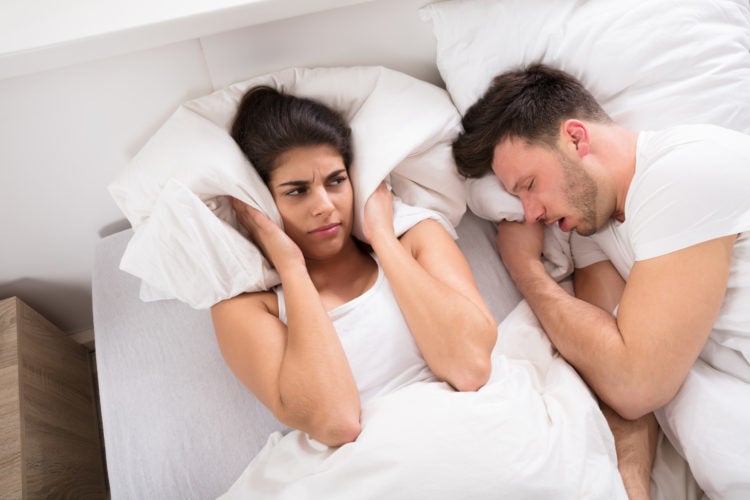What Does My Snoring Mean & What Should I Do About It?


If you’re someone who snores, you probably already know it’s a problem. Snoring can disrupt your sleep as well as the sleep of anyone sharing your room, and can even have a negative impact on your relationship with your significant other. Unfortunately, if your snoring is due to obstructive sleep apnea, disrupted sleep may only be one of many problems you’ll face.
Snoring doesn’t necessarily indicate sleep apnea, but if you have sleep apnea, you will snore. Snoring generally happens because of airway obstruction, and even minor obstruction can cause you to snore. With obstructive sleep apnea, though, the airway obstruction causes the airflow to the lung to be significantly diminished.
- What causes sleep apnea? Weight is often a risk factor, but it’s only part of the story. If you’re overweight, it can contribute to “crowding” in the sides and back of the throat. However, the tonsils or the tongue can also cause anatomical obstruction, and this obstruction, combined with diminished muscle tone in the throat while you sleep, is a big factor in both snoring and sleep apnea.
- What are the symptoms of obstructive sleep apnea? Someone with sleep apnea may gasp or choke while sleeping or have episodes of stopping breathing while asleep. During the day, apnea sufferers may experience sleepiness, headaches, fatigue, and behavioral changes.
- Is there anything that someone can do about snoring? To get a handle on your snoring, you might try losing weight and making some changes to your sleeping routine. Consider adding an extra pillow to keep your head propped up, and try not to sleep on your back. Don’t drink before bed, and on top of your allergies by taking allergy medication and maintaining a clean sleeping environment. This may help prevent congestion and obstruction that can cause snoring.
- If I think I have sleep apnea, what should I do? See your doctor as soon as possible. Sleep apnea can lead to serious health issues, increasing your risk of heart attack, high blood pressure, irregular heartbeat, and stroke. It can even affect your mental health, increasing anxiety, and depression.
- What will my doctor do to help with sleep apnea? Your doctor may suggest a CPAP machine to help keep your airway open, but there are also many other options available. Your dentist may be able to help, too, with solutions like a custom-made sleep appliance.
At Park 56 Dental Group, we provide personalized, quality dental care in a spa-like environment. We offer pediatric, prosthodontics, endodontics, oral surgery, Invisalign®, emergency, and sedation dentistry, all at the highest level of treatment. We serve the Midtown, Central Park, Upper East Side, Park Avenue, and all surrounding Manhattan and New York areas, with a patient-centered practice that has hours to fit your schedule. Schedule your complimentary consultation today by contacting us online or calling us at (212) 826-2322.
RECENT POSTS
categories
- Uncategorized
- Cosmetic Dentistry
- Veneers
- Healthier Teeth
- Teeth Whitening
- Dental Health
- Video
- Dental Emergencies
- Invisalign
- Dental Implants
- Root Canal
- Sedation Dentistry
- Infographic
- Dental Crowns and Bridges
- Dental Anxiety
- Gum Disease
- COVID-19
- Bad Breath
- New York Dentist
- Cut out sugar
- General Dentistry
- Oral Health
- Oral Cancer
- Dry Mouth
- Gum Health
- Toothache
- Dental Sealants
- Cavities
